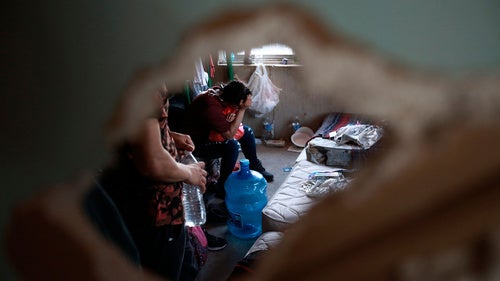How America's Retreat from Refugee Protection Undermines Global Stability

In reshaping its approach to asylum and refugee resettlement, the United States is signaling a departure from the principles it once championed and risking erosion of international norms.
The Trump administration is dismantling the United States Refugee Admissions Program and lobbying other countries to weaken protections for at-risk refugees and asylum seekers. The stakes for millions of refugees in need of resettlement are high. The administration’s actions threaten not only them, but the fundamental principles underlying the global refugee protection system.
At a September 25 event held on the sidelines of the United Nations General Assembly, US Deputy Secretary of State Christopher Landau presented a set of new principles for “reforming” the international asylum system, including that an asylum seeker must apply for protection in the first country they reach, that refugee and asylum protections should be temporary, that governments who provide protection should be able to decide arbitrarily when it is safe for an individual to return home, and that countries of origin must accept the repatriation of its citizens.
Asylum is essential to the international system of refugee protection and grounded in the 1951 UN Refugee Convention and its 1967 Protocol. It was written into US law by the Refugee Act of 1980. A grant of asylum provides a pathway to permanent protection, residence, and citizenship in the United States, and draws on the core legal principle of non-refoulement, meaning a person should not be returned to a country where they would face persecution, torture, or death.
Asylum is granted to those already in the United States whom federal authorities have determined have a well-grounded fear of persecution should they be forced to return home. Resettlement provides lasting protection to the most at-risk of those who have fled their home country and are living temporarily in another host country. In the 45 years since its establishment, the US Refugee Admissions Program has provided safety, freedom, and opportunity for more than 3.3 million refugees.
"In the 45 years since its establishment, the US Refugee Admissions Program has provided safety, freedom, and opportunity for more than 3.3 million refugees."
In the first days of his second term, President Trump suspended refugee admissions, followed by executive prioritization of one population, Afrikaners, over all others awaiting refugee processing. A visa ban was put in place to restrict travel to the United States from many of the largest countries of origin for refugees. Consequently, and despite court intervention, the United States has admitted vanishingly few refugees since late January. As for future admissions, each year, the US president sets an annual refugee admissions goal; this number has typically ranged between 75,000 to 90,000 and has been as high as 217,000. The admissions goal for the 2025 fiscal year was set at 125,000. President Trump dropped it to 15,000 in the last year of his first term. Press reports now indicate that he intends to set the number at a historic low of 7,500 for the new fiscal year that began on Oct. 1. The overwhelming majority of those to be admitted will be Afrikaners, who are being fast-tracked through the resettlement process.
These actions break faith with welcoming communities across the country and with refugees abroad, more than 120,000 of whom have already been conditionally approved to resettle in the United States. It abandons Syrian and Sudanese families fleeing brutal regimes and war zones, Congolese and Eritrean survivors of rape and ethnic violence, and Afghan allies promised safety after risking their lives alongside US forces. By cutting the resettlement goal by more than 90 percent from the previous year, the Trump administration is not only abandoning refugees already referred to the United States but encouraging other resettlement countries to significantly reduce the number of refugees they resettle.
At the opening plenary of the annual UN Refugee Agency Executive Committee meeting in Geneva, Switzerland—held just two weeks after Landau’s comments— High Commissioner Filippo Grandi said: “Sovereignty and the right to seek asylum are not incompatible. They are complementary . . . In an environment where everything is highly politicized, putting the Refugee Convention and the principle of asylum on the table would be a catastrophic error. It would lead us down blind alleys and, ultimately, it would make the problem more difficult to address.”
The US asylum system should be modernized and strengthened, but the solution is not to shut it down, as the Trump administration appears to be doing.
"The US asylum system should be modernized and strengthened, but the solution is not to shut it down, as the Trump administration appears to be doing."
Before they are permitted to enter the United States, refugees face rigorous security vetting that can take months and, more typically, years. When they at last arrive, they are welcomed to cities and towns across the country through a large-scale public-private partnership that relies heavily on local nonprofit agencies and private sponsor groups, often grounded in communities of faith. If adjudication backlogs are too large, we should increase the number of immigration judges. If asylum seekers are coming to the United States primarily to work, we should widen the availability of economic and labor pathways. We should address the root causes that drive forced displacement, invest in local communities’ capacity to welcome, and ground our policies in a humane and compassionate approach.
The United States has the responsibility to reverse course and uphold, preserve, and strengthen international and US refugee law by operating the refugee resettlement and asylum programs in good faith, fully restoring access to humanitarian protections—regardless of nationality, race, or religion—and encouraging other countries to do the same.
Policies that withdraw from or ignore sound refugee policy do nothing to support our national security, economic, legal, or moral interests.


Related Content
 Migration
Migration
While majorities of Democrats and Independents support a path to citizenship for immigrants living and working in the United States illegally, only four in 10 Republicans agree.
 Public Opinion
Public Opinion
Survey data show that regardless of when they arrived in the United States, immigrants embrace a shared vision for US foreign policy.
 Public Opinion
Public Opinion
Republican views of immigrants and immigration policy largely diverge from overall American attitudes.